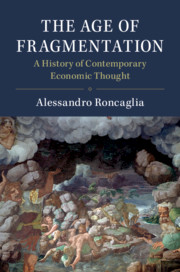Book contents
- The Age of Fragmentation
- The Age of Fragmentation
- Copyright page
- Contents
- Acknowledgements
- 1 Introduction: A Non-linear Discourse
- Part I The Background
- Part II The Giants of the Short Century
- Part III The Disgregation of the Mainstream
- Part IV The Weakening of the Paradigm
- Part V Is a New Paradigm Possible?
- 12 Post-Keynesian Macroeconomics
- 13 Marxism, Evolutionism, Institutionalism
- 14 Ethics and the Problem of Power
- References
- Index
12 - Post-Keynesian Macroeconomics
from Part V - Is a New Paradigm Possible?
Published online by Cambridge University Press: 25 November 2019
- The Age of Fragmentation
- The Age of Fragmentation
- Copyright page
- Contents
- Acknowledgements
- 1 Introduction: A Non-linear Discourse
- Part I The Background
- Part II The Giants of the Short Century
- Part III The Disgregation of the Mainstream
- Part IV The Weakening of the Paradigm
- Part V Is a New Paradigm Possible?
- 12 Post-Keynesian Macroeconomics
- 13 Marxism, Evolutionism, Institutionalism
- 14 Ethics and the Problem of Power
- References
- Index
Summary
In the framework of a critical illustration of the contemporary history of economics, this chapter discusses post-Keynesian macroeconomics: the Cambridge tradition and the new Cambridge school. Some of the main protagonists are considered separately: Kalecki, Kaldor Kahn, Joan Robinson and others. The debate on the interpretations of Keynes is then recalled, as well as the debate on the theory of capital and the critique of the marginalist value theory. Kaldor’s and Pasinetti’s post–Keynesian (or ‘Cambridge’) theory of distribution is then illustrated, as well as the developments of the different ‘Sraffian schools’ with the aim of constructing a renewed classical approach. In this direction, some suggestions for a classical–Keynesian synthesis are provided.
Keywords
- Type
- Chapter
- Information
- The Age of FragmentationA History of Contemporary Economic Thought, pp. 289 - 318Publisher: Cambridge University PressPrint publication year: 2019

